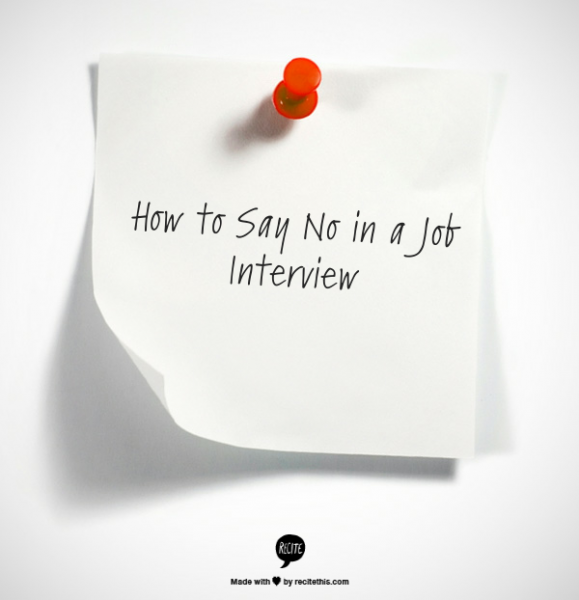
During a job interview, it is important to create an atmosphere of positivity and to avoid saying things that are negative. Due to human nature, we don’t like to hear negative things or to hear the word “No”. The Japanese, who are obsessed with maintaining social harmony, are known to never utter the word “No” in business meetings (even though their actions might speak otherwise).
So it is all the more important, during an interview setting, to cast yourself in an agreeable light, and to remove any connection between yourself and something that might be construed as negative, unpleasant or disagreeable.
Invariably, your interviewer may ask questions where you may need to respond in the negative. There are several ways to do this, without appearing adverse or non-committal. Here are 5 ways to answer interview questions without saying the word “No”:
1. What if you’re asked about specific job skills or work experience which you don’t have? Rather than saying, “No, I don’t have those skill sets,” you can say: “Those are skill sets that I have been meaning to learn.” Be prepared to talk about those skill sets which you lack. Don’t dwell on the fact that you don’t have those skill sets, but you should at least address the question in a positive manner. You might say, “While I don’t have direct experience in this area, I did have a chance to cover for a co-worker who handled that area, and this is something would like to learn how to do well.”
Or you can tell them what you do know about the area, even if you don’t have direct experience: “I’ve heard a lot about this new language protocol, and it’s catching rapidly among companies in the resources industry. This is something I’d love to learn how to do.”
No one can be expected to have all of the skill requirements set out in the job description, so don’t feel bad. The fact that you were invited for the interview means they are interested in what you have to offer.
2. Did you enjoy working for your previous company/boss? Even if your answer is a resounding “No,” now is not the time to vent about how awful your boss was, or how your former company is destined to go bankrupt due to mismanagement. Take the high road, and try to say something redeeming. “My former boss was wonderfully skilled at what he did,” or “My old firm was renown in the industry for running powerful marketing campaigns. (Alprazolam) ” If you say something negative, you might appear spiteful or bitter, and that is not the impression you’d like to leave.
3. What if you were asked to handle job responsibilities not mentioned in the advertised job position? If these responsibilities aren’t what you expected from the job, you want to think about a benign way of saying that you’re not interested. You might say, “Well, I really think my talents are better focused on doing X, Y, Z.” Or you can say, “I’m not sure if I have the experience or skills to perform that particular task; I’m not even sure I’d be any good doing that.” At the very least, you might tell them that you’d consider it. If the interviewer is astute, she can tell by your body language that you aren’t particularly receptive to taking that job responsibility, and that’s the point that you want to get across.
4. What if you were asked whether you’d take a pay cut for the job? You might be tempted to tell them where they should go, but restrain yourself, and politely mention that one of the primary reasons for looking elsewhere is for greater remuneration. You may even add that you have larger household expenditures. But if the job is attractive enough, you might say that you’d consider it. For example, if the position carried less responsibilities, or allowed you to work from home one or two days a week, then a pay cut might be worth the exchange, as long as you were not financially constrained.
5. Are you willing to work weekends or evenings? If you’re unable to work weekends or evenings due to family commitments, just tell them honestly. If they have families, they will understand. If it’s an occasional event, such as finishing off a project, or closing a deal, then you’d have to say “Yes” in order to be viewed as a team player. In general, the more senior the role, the more willing you’d have to be to work outside of 9-to-5 hours.
By now, you get the gist of what I’m saying. The art of saying “No”, without actually saying “No”, means taking the question, and it turning it around, so you end up saying something positive and constructive, while telegraphing your true intention. It shows diplomacy and tact on your part, and if your interviewer is smart enough, he might give you extra points for your polished communication style. So learn from the Japanese, keep the interview positive and upbeat, avoid making anyone feel awkward or embarrassed by hearing the word “No.”
Create the resume you use for BCjobs.ca with Milton Kiang, B.A., LL.B. at Resume Services Vancouver.
Read also:



